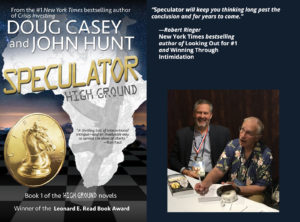Archive for Month: September 2016
Buy Speculator Now
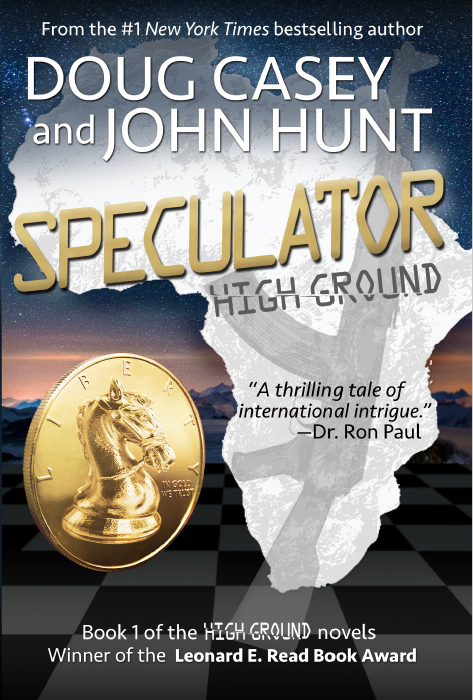 Launch day is here! You can now buy Speculator in paperback or ebook from these fine stores:
Launch day is here! You can now buy Speculator in paperback or ebook from these fine stores:
Paperback on Amazon
Kindle on Amazon
Ebook on iTunes
Ebook on Kobo
Ebook on Barnes & Noble
Speculator — Chapter 1 Teaser
Just a few days left until you can read Doug Casey & John Hunt’s full new novel. (Pre-order here.) But, just to whet your appetite, here is the very beginning of …
… SPECULATOR
Chapter 1
A RESOLUTION ALMOST UNRESOLVED
(A CLIFFHANGER IN THE JUNGLE)
Charles Knight stood tall at the edge of a precipice. Far below, the tumultuous Bangu River scoured its path along an ancient fault while its roar echoed up the canyon walls it had carved over the eons. He gazed over hundreds of square miles of thick African bush.
The decades-old geologic surveys conveyed none of the continent’s colors, its fragrance, the weight of its air. To the north stood steep hills capped with erosion-resistant dark-green basaltic rock—the congealed blood of extinct volcanoes. To the west, a ghostly band of gray clouds, pregnant with rain, floated at the horizon. When the rain arrived, it would come in torrents, the likes of which few people on the planet ever experienced.
The ledge on which Charles now stood had suffered the assault of such rain for millennia. Little remained of the limestone glue that had, for all that time, maintained the integrity of the rock. The additional stress of his 180 pounds simply proved too great. With a sound no louder than a sigh, the once solid rock transformed into fluid under his feet. He felt it happen. He knew what it implied. Gravity, its will defied too long, would wait no more.
He reached for anything solid and found nothing. Sadness at lost opportunities weighed upon him more than fear. His twenty-three years of life would end as an irregular stain on the jagged brecciated rock two hundred feet below, a stain that would appear only after agonizing bounces off outcrops that would mangle his body on the way down.
There was nothing Charles Knight could do but die.
And the nearest person who would give a damn was 5,000 miles away.
Pre-order Speculator now in print or kindle. Full release is September 27.
Gondwana Map
The action of Speculator begins here — in the African country of Gondwana, in that B-F mining exploration tract right on the border with Guinea.
Gondwana is not quite a real country. But it’s damn close to being real.
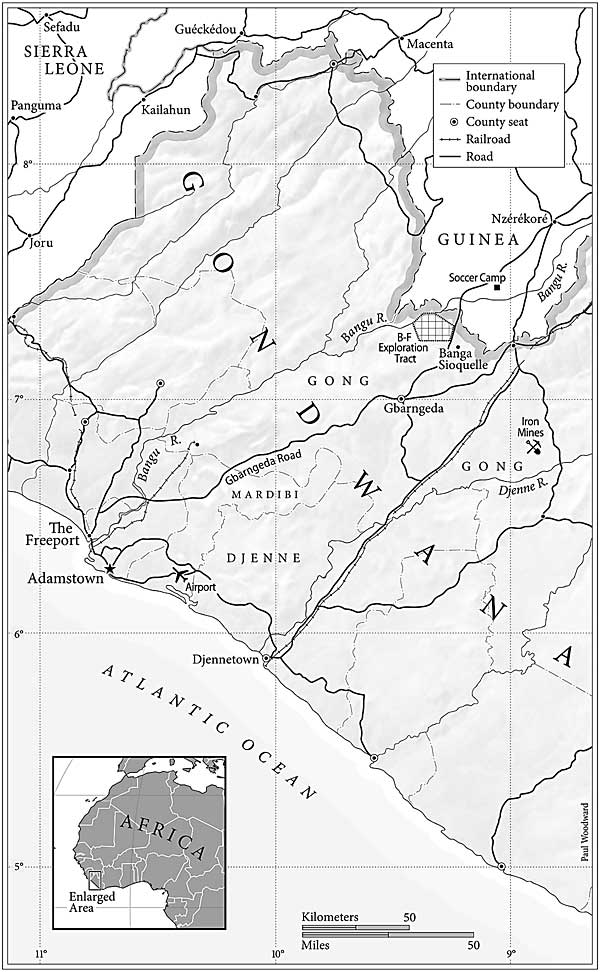
You can pre-order Speculator now.
Doug Casey on the Recent Corruptions of the English Language, Part II

Fair. That’s a great word. But everybody’s got a different idea of fair. Put a bunch of money on the table, and let’s divide it up. Well, what’s fair? I don’t know. But I guarantee everybody will have a different idea of what’s “fair.” So, let’s forget about the idea of fair, because nobody knows what that is. It’s a floating abstraction. I have a better idea.
Whatever happened to justice? What is “just”? It means everybody gets what they deserve. Now, perhaps you can solve the problem. It’s a bit more specific, more focused, to find out what you deserve as opposed to what’s fair. Because, frankly, some people don’t deserve anything. Simply existing doesn’t necessarily give you a right to a piece of the pie—or even a right to vote on it. But nobody talks about justice today; they talk about fairness. And, of course, this corrupts the moral character of society.
What about freedom of speech? You can forget about freedom of speech. One reason is because nobody knows what words mean anymore. You need words in order to speak. But if you don’t define and use words accurately, they mean nothing. Forget about all the non-PC words you’re not even allowed to think, much less use. Freedom of speech is a phrase now divorced from reality. It’s actually no longer very important, except, oddly enough, among the political classes, where it’s become very important in exactly the wrong way. Because freedom of speech, today, often means hate speech.
I’m not an antagonistic person, and I like most other people, if they’re of good character. Here’s a shocker for you: I don’t see anything wrong with hate speech. Why? Because there are a lot of things in the world worth hating, because they’re evil and destructive.
But, if you want to live in a civilized environment, you shouldn’t conflate so-called hate speech with bad taste. Most so-called hate speech is simply bad taste or stupidity. Outlawing hate speech is far worse than anything that can possibly be said.
One good thing about hate speech is that it lets you discover something about the person speaking. If he can’t speak, you may not really know who you’re actually dealing with. Which can be dangerous.
Well, of course, now that we have “hate speech,” that draws attention to “aggressive speech.” That’s another newly coined phrase. Be aware of neologisms, newly minted words that the average chimpanzee uses as if they’d been around since the day of Aristotle. One of them is microaggression. This one is really popular with so-called minorities at universities today. It can occur when somebody says something that—by really parsing it in the manner of a Talmudic scholar—might make a person feel uncomfortable. As a result, these weenies are demanding segregated “safe spaces.”
It’s not just completely ridiculous. It’s actually psychotic.
You should laugh off the concepts of microaggressions and safe spaces, revel in free speech, and recognize the difference between hate speech and bad taste speech.
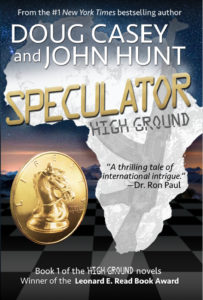
“And that’s a genuine fact.” Does anybody say that anymore? Another change in the language over the last generation is that nobody says fact anymore. Facts are now factoids. “Here’s a factoid.” Do you know what a factoid is? It’s an artificial fact, or something that looks like a fact but isn’t. What, for instance, is an asteroid? An asteroid is something that looks like a star but isn’t. What’s an android? An android is something that looks like a human but isn’t. That’s what the ending -oid means—something that resembles the object in question. So, a factoid is really a phony, made-up fact, a created fact.
I never say “factoid” unless I mean something that somebody’s made up. It’s a BS fact. What they really mean to say, to be cute, is factette. A little fact. A trivial fact. But people now use factoid. They don’t even think about what the word means. But that’s true of so many words today…
Like United States. Everybody likes the United States. Well, I’m not sure I do, because they so often conflate the United States with the U.S. government. Talking heads will say, “The U.S. did this. The U.S. should do that.” Wait a minute. Do they mean the nation-state that lies in between Canada and Mexico, or do they mean the U.S. government? They’re almost always talking about the U.S. government. So, they’re conflating the U.S. itself, a conglomeration of 300 million people, with the U.S. government.
They’re two different things. The U.S. government has a life of its own. And it only really cares about the U.S. the way a flea cares about a dog. A flea needs the dog; it wants the dog to survive. But not because it cares about the dog itself. The prime directive of every living being, whether it’s an amoeba or a corporation or a government, is SURVIVE. That’s the prime directive; it comes before anything else. The U.S. government is an entity that has a life of its own. Its prime directive is looking out for number one. So, don’t conflate the U.S. and the U.S. government. If you mean the government, say it. If you mean the country, say, “… the U.S., and I don’t mean the U.S. government.” Unfortunately, it’s now necessary to be extremely clear. Otherwise, people will assume what they will…
But it’s worse than that, because people now conflate the U.S. with America. They’re totally different things. America is a unique concept, and it was an excellent concept. Its values—what it stood for, at least in theory—were actually unique in the world’s history. But people conflate that with the U.S., which is now really just another one of the 200 nation-states that cover the face of the Earth like a skin disease. I’m all for the idea of America. It’s unique, it’s good, it’s wonderful. But the U.S. is just another nation-state, like Burundi, Burma, or Ecuador—there’s less and less practical difference. Be especially careful when you conflate the U.S. and America.
Another good thing that people always confuse, conflate, and define improperly today is health care. “We need the state to pay for health care.” “I want to buy some health insurance.” No, you don’t. And, no, you can’t. What they mean to say is medical care. Health care is something you do for yourself. It’s diet, it’s exercise, it’s prudent habits. Those things increase your odds of having health. They’re how you maintain your health. Your insurance policy, whether it’s Obamacare or something else, can’t maintain your health. It only insures some costs of your medical care.
Recall the beginning of the movie Dances with Wolves, when they show the surgeon cutting off people’s limbs on a battlefield. That’s medical care, in effect, emergency damage control. It’s important and necessary, but medical care can’t maintain your health. That’s something you do. But people love to use the words health care; it sounds so wholesome.
The political classes never say “medical care”; they always say “health care,” because everybody wants to be healthy, but people are scared by medical care. It means anesthesia, doctors cutting into you, and dread diseases. That’s why health insurance is so easy to sell to the average chimpanzee. It’s because he thinks to himself, “Yeah, health insurance. Sure, I want to insure that my health stays good.” He doesn’t want to think about medical care; that’s a scary scientific thing. So, please don’t say “health insurance” when you really mean “medical insurance.”
I just mentioned the movie Dances with Wolves. That was partly about the so-called American Civil War. Well, no, it wasn’t a civil war, and you shouldn’t call it “the Civil War.” A civil war occurs when two or more groups use military violence in trying to take over the same government to control a designated area. That’s not what the so-called U.S. Civil War was about. It was actually a war of secession, where the Southern states were simply trying to secede. A war of secession is totally different from a civil war.
The Spanish Civil War was a real civil war. There, the fascists and the communists were both trying to take control of the same real estate. What we had in the U.S. was not a civil war; it was a war of secession. So, call it the War Between the States. Some call it the War of Northern Aggression.
Here’s another one: concentration camps. Who can tell me when concentration camps started, and who started them? No one?
Most people would say, “Oh, it was those damn Nazis in World War II.” No, it wasn’t. It was the Brits, the wonderful Brits, our perpetual allies, in the Boer War in South Africa. The Afrikaners call it the British War for Gold. The British created the first concentration camps in modern history, incarcerating and intentionally starving scores of thousands of mostly women and children. But that’s kind of forgotten, since the victors always write the history. Or “herstory,” which, believe it or not, some “gender equality” types prefer to say. They believe everything should be politicized whenever possible.
When I was in college, people used to joke, “We’ll never have concentration camps in the U.S.; we’ll call them something else.” And, by God, it was a joke in those days—but today, it’s actually true. We now call them detention facilities.
Talking about war and concentration camps, do you all remember that until 1946, the U.S. government used to have something called the War Department? That’s what it was called. The U.S., technically speaking, didn’t go to war unless Congress declared war. But since World War II, it’s had nothing but undeclared wars. From Korea and Vietnam, which were pretty big wars, to all these little, but very expensive, sport wars we get into now.
We don’t have a War Department anymore. That would be too honest. It’s called the Defense Department, but it doesn’t defend the U.S. Actually, it draws in trouble and danger to the U.S. They should call it the Opposite of Defense Department, because it’s actually the biggest single existential danger to the U.S. Entirely apart from the fact that, fiscally, it’s going to bankrupt the U.S.
A generation from now—assuming they don’t start World War III, I wouldn’t be surprised to see the Seventh Fleet rotting at the dock like an Argentine destroyer, or like the Soviet Navy 20 years ago. But in the meantime, don’t call it the Defense Department. It doesn’t defend anything.
You may be thinking, “This guy doesn’t sound like a patriot.” Patriot. That’s a loaded word. “I’m a patriot, you’re a nationalist, he’s a jingoist.” I’m not sure I know the difference. Why is everybody supposed to be a patriot of the country that they’re born in? I don’t care if you come from Rwanda; you’re supposed to be a patriot. It’s a ridiculous concept. My country is the best one in the world, because I was born there. It’s an accident of birth.
If you were born just five feet north of the Canadian border, now you’ve got to be a Canadian patriot.
At what point does a patriot turn into a nationalist? And at what point does a nationalist turn into a jingoist? Patriot is a word to use very carefully. Be very, very careful of people that use it promiscuously, because they usually don’t know what it means, nor what its implications are. And they’re often warmongers.
It’s similar to the axiom “I’m a freedom fighter, you’re a rebel, he’s a terrorist.” It’s mostly a point-of-view thing. But don’t dare broach the subject to a patriot. God forbid a nationalist or a jingoist should hear it.
It’s funny how they call these ISIS people in the Middle East—horrible people, quite frankly—they call them terrorists. Well, I don’t know. They’ve established their own nation-state in exactly the way most nation-states are established. You know, by killing the people that were there before, taking over the government, and killing people that fight against them. They’re nasty. I don’t like them; I’d be one of the first people they’d put up against the wall. But that’s how most states get started. They’re just as legitimate as any other nation-state out there today.
People say, “Well, they shouldn’t dismember Syria.” Well, Syria is not a real country. It’s a dozen different tribes that mostly hate each other. Iraq is not a real country, either. It’s at least three separate, distinct countries. Afghanistan, Pakistan, India—none of these is a real country, either. None of those countries in the stans is a real country. What do I mean by that? They have no real ethnic, tribal, religious, cultural, or linguistic homogeneity. None of the countries in Africa is a real country, either. It’s crazy to consider them countries. A real country is homogeneous. There are very few—places like Denmark and Finland—unless they’re overwhelmed with migrants. Most “countries” are actually domestic empires.
Non-interventionism. There’s nothing wrong with non-interventionism. It’s a highly benign concept, but nobody says that. If you don’t want to stick your nose into somebody else’s business and kill the natives, then you’re called an isolationist. “These are the good natives; those are the bad natives.” I can’t tell the difference, and I promise you, the morons in Washington can’t, either. Conflating the pejorative word isolationist with the benign non-interventionist typifies the intellectual dishonesty that’s accepted—and rarely challenged—today.
Actually, what have I been talking about this whole speech? I’ve been talking about stupidity. So, why don’t we define the word stupidity? It’s usually taken to mean a low IQ. But that’s not a very helpful definition. It’s rather circular.
More accurately, stupidity is the ability to see the immediate and direct consequences of an action, but an inability to see the indirect and delayed consequences. That’s a much more useful definition of stupidity. But I’ll give you an even better one. It’s an unwitting tendency toward self-destruction. And so, when I use the word stupidity in reference to the misuse of words and the conflation of concepts, it’s appropriate. These things are not trivial factors in the degradation of Western Civilization.
And we’ve only scratched the surface of the problem in the last few minutes.
Previous published at CaseyResearch.com.
Doug Casey on the Recent Corruptions of the English Language, Part I

Let’s discuss words. Many of the words you hear, especially on television and other media, are confused, conflated, or completely misused. Many recent changes in the way words are used are corrupting the language. The corruption of language is adding to the corruption of civilization itself.
Words are extremely important because they provide the most important means we have to communicate with each other. If you don’t mean what you say and say what you mean, then it’s impossible to communicate accurately. Do you remember that famous line at the end of Cool Hand Luke, when Paul Newman gets shot? “What we’ve got here is failure to communicate”? That’s what I want to talk about.
Where shall I start, because there are over a million words in English? I’ve rather arbitrarily chosen a few that are especially relevant to investors and freedom lovers. Many of these words are popular with the political classes.
For instance, stimulate the economy. That phrase came out in the ’60s. It really just means “print up money.” They don’t use it much anymore because they can see it no longer results in stimulus; rather, the opposite. Now it’s called quantitative easing. And everybody uses it without questioning the fact that it means “print money,” “inflate the currency,” or “debase the currency.” They say “quantitative easing” with no irony. It makes me think the chattering classes are actually, in reality, quite stupid. I’ll discuss that word—“stupid”—later.
The “powers that be” use a word, and all the jabbering monkeys follow their lead using the same word. I advise you to call them on it. When you use the enemy’s language, you’re playing the enemy’s game on his field. And you can’t win a battle when you do that.
You may have noticed, for instance, that over the last 10 years, they only talk about gold in terms of tonnes. Not ounces, tonnes. This is doubly confusing to the average guy. Because they’re basically innumerate. Most people are unaware that there are two kinds of tons. There are metric tonnes, which are 1,000 kilos, or 2,204 pounds. And English, or short tons, of 2,000 pounds. And a lot of times, when I see things written, they’ll write “a ton of gold,” and they spell it T-O-N. It’s totally different from a T-O-N-N-E of gold, but nobody knows that, including the ignorant journalists.
But they shouldn’t be using either “tonnes” or “tons.” If you’re going to price something in ounces, and use something in ounces, and miners report it in ounces, it’s idiotic to insert “tonnes” into the conversation. Nobody buys or sells or uses a tonne of gold. Even though gold is priced in dollars per ounce, you have fools who talk about tons or tonnes—not having a clue how many troy ounces are in either of them. Or even vaguely knowing what a tonne of gold is worth. But it serves to make the subject of gold more confusing, and more irrelevant, to the average guy.
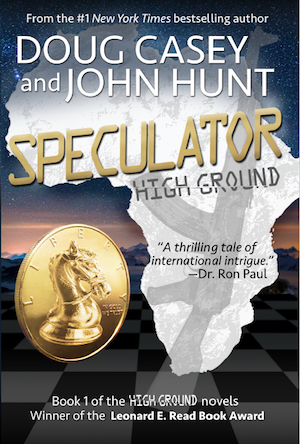
—John Mackey, Founder, Whole Foods Market
Pre-order now
Let’s talk about bonds. I’m short bonds right now. But do you remember when debt instruments used to be called bonds and debentures? That is a critical but totally lost distinction.
A bond is a debt instrument that is guaranteed by a specific asset in addition to the company’s credit. A debenture is a debt instrument that is just guaranteed by the issuer’s general credit.
Whatever happened to debentures? Apparently, they don’t exist anymore. Why? Because although almost all debt instruments are debentures today, they’re now called bonds—which are better than debentures. It’s subtle, dishonest, and indicative of what’s happened to the credit universe in general. Things are made to look better than they, in fact, are.
Another one. Time deposits and demand deposits. Some of you may remember the proper use of those terms. But, now, they’re completely conflated. Banking is actually two totally separate and different businesses combined into one. With time deposits, you give the bank X number of dollars for a specific length of time, and then the bank guarantees you a specific amount of interest.
Why? So it can lend it out at a higher rate of interest for an identical amount of time, generally in a self-liquidating, secured business loan to somebody of substance. Consumer and mortgage loans are out of the question to a sound banker.
Time deposits still—kind of—exist in the form of CDs, but they’ve generally morphed into savings accounts in the common vernacular. And even those have disappeared and have been conflated with demand deposits—called checking accounts by most people. They are totally different animals. At least if you’re running a sound bank. Historically, with checking accounts, the bank doesn’t pay you interest; you pay the bank a fee. Why? For the service of storing your money, and the convenience of writing checks against it. It’s as if you gave your furniture to Allied Van and Storage, paying them to store it. Now, this distinction is totally lost, and they can, in effect, lend your furniture out. This, plus the fractional reserve system, is why all the world’s banks are illiquid, and most are basically bankrupt.
Investment. Savings. Everybody uses these words, often interchangeably. But nobody ever defines them, because they don’t understand what they actually mean. So, they’re misused and conflated. What is investment? “Investment” is the allocation of a certain amount of capital to a productive enterprise, intended to create more capital. It’s like planting a seed. “Savings” is simply putting aside the fruits of past production. You should produce more than you consume. When you set aside the excess, that is savings. Saving creates capital, and with capital, you can invest. But now, the concepts of savings and investment are conflated. The difference between them is undefined and therefore uncertain in the public’s mind.
Speculation. A lot of people think, “Speculation? Oh, that’s gambling.” Well, actually no. Speculation is allocating capital not to create more capital, but to take advantage of distortions and misallocations created in the market—usually by government interference. Gambling is to engage in a game of chance—roulette, dice, or the like. Since most people in the markets have no idea what they’re doing, they actually are gambling—just using their brokerage house as a casino. Perhaps that’s why people conflate the two things.
Shareholders and stakeholders. We all know that a shareholder actually owns a share in a company, but have you noticed that over the last generation shareholders have become less important than stakeholders? Even though stakeholders are just hangers-on, employees, or people who are looking to get in on a shakedown. But everybody slavishly acknowledges, “Yes, we’ve got to look out for the stakeholders.”
Where did that concept come from? It’s a recent creation, but Boobus americanus seems to think it was carved in stone at the country’s founding.
We’re told to protect them, as if they were a valuable and endangered species. I say, “A pox upon stakeholders.” If they want a vote in what a company does, then they ought to become shareholders. Stakeholders are a class of being created out of nothing by cultural Marxists for the purpose of shaking down shareholders.
Inflation. This is one of the most misused words; few even think about its actual meaning. What is inflation? “Well, that’s prices going up.” No, it’s not. To say that is to confuse cause and effect. Inflation is an increase in the money supply. You inflate when the money supply is increased by more than real wealth increases.
Prices go up as a result. People have forgotten about that. Today, inflation seems to come from out of nowhere, like a freak storm. No cause. Unless it’s blamed on the butcher, or the baker, or an evil oil company. Nobody ever thinks it’s a central bank—the Fed in the U.S.—that actually creates more money, and causes inflation.
You’ve heard that the Federal Reserve is trying to create a little bit of inflation because, they say, “A little bit of inflation is good.” No, even a little bit of inflation is deadly poisonous. For two reasons: It creates the business cycle. And it destroys the value of savings. Saving is the basis of capital creation. People who say that a little inflation is a good thing are dangerous fools.
Well, what about deflation? That’s a bad thing, they say. Well, is it? In fact, deflation is a natural thing in a healthy capitalist economy. Why? Because in a healthy capitalist economy, every year, more wealth is created. An increase of wealth means prices, denominated in a sound money, will go down. And when prices go down, it means that the money you saved is worth more. Your standard of living will rise.
Deflation encourages saving. And that’s a good thing, not a bad thing, because remember, savings represents the excess of production over consumption. That’s how you get wealthy, by producing more than you consume and putting aside the difference.
And when you have deflation, where your money becomes more valuable every year, you’re encouraged to save. When the government destroys the currency by inflating it, saving is discouraged. Of course, at this point, because of the unsound monetary system, we might get a catastrophic deflation. A credit collapse.
Another misused word is money. Money can be defined as a medium of exchange and a store of value. Historically, it’s always been something tangible. For instance, cows or salt. The word pecuniary comes from pecus, which is the Latin word for cow. We get salary from the Latin word for salt. But gold and, sometimes, silver have always been preferred as money.
What you’ve got in your wallet, however—those dollar bills—are currency. Currency is a relatively recent invention. It’s the government’s substitute for money. It originated as a receipt for money, i.e., gold. Currency no longer has any relationship to money. And now, forget about even having currency; it’s all about credit. Even currency is going out of circulation with the War on Cash. Soon you’ll only have credit, ephemeral digits in the ether. Everything you buy or sell will go through your bank account, so the powers that be can know exactly what you’re doing. It’ll be pretty much impossible to evade taxes. Or maintain any privacy. The world’s rapidly going in that direction.
It’s a huge mistake, and we should not do that. Wait a minute—what did I just say? I said, “We should.” Those are perfectly fine English words except when they’re used together. We should. You remember Tonto and the Lone Ranger? Do you remember the joke about when they were surrounded by a bunch of hostile Indians—excuse me, Native Americans—and the Lone Ranger says to Tonto, “Tonto, we’re in a lot of trouble.”
And Tonto looks at the Lone Ranger—incidentally, Tonto means “stupid” in Spanish—and says, “What do you mean we, white man?”
We is a dangerous word. Especially when combined with “should.” It often occurs in political speeches or in comments by talking heads. Listen to the imbeciles on TV, and see how many times the words we should occur. I’m sympathetic to Tonto.
Another word the political class uses a lot lately is diversity. “We’ve got to have diversity.” No, we don’t have to have diversity. I don’t see why every room has got to have a few blacks, Hispanics, or women. Well, of course, half of the human race are women. But I occasionally like to go to a men’s club. It’s odd that men are never invited to ladies’ functions—and don’t care.
In fact, birds of a feather usually flock together. This is perfectly natural. I don’t think you need diversity. If you want it in your club, fine. But freedom of association is far, far more important.
I form my friendships based upon neither diversity nor a lack of diversity, although there’s a natural tendency to associate with people like yourself. I form my friendships based upon the character and the beliefs that a person has. The attributes that create diversity are stupid accidentals. The fact that diversity is emphasized draws attention to incidentals like race, sex, and gender, and diverts it from important things like character and beliefs. Diversity has become destructive. Cultural Marxists love it because they hate people.
Unity has also become poisonous. That’s another one moronic politicians love to invoke: “We’ve gotta have unity.” No, we don’t have to have unity. In fact, we shouldn’t have unity. Unity is dangerous. It’s what happens when all the chimpanzees get together and start hooting and panting to create a war. People like Hitler, Stalin, and Mao required unity.
Remember when it was okay to have bank secrecy, or any kind of secrecy? And then secrecy became somehow wrong. So, moral cowards said, “Let’s just have privacy; the word sounds less threatening.” Well, you can forget about privacy, too. Now, you’re just supposed to have transparency. That’s another word that’s just been revitalized in the last politically correct generation or two. It’s promoted by busybodies as a good thing.
Transparency is a condition where everybody can see everything. Frankly, in my life, I don’t want everybody, or anybody for that matter, to see anything; it’s none of their damn business. The ability to maintain privacy or secrecy is one thing that separates civilized men from primitives living in mud huts. I don’t acknowledge either the necessity or the automatic goodness of transparency.
Now, if I own shares in a publicly traded corporation, as a shareholder, I’ll demand transparency from the management. Generally speaking, management shouldn’t be trusted. They’re hired suits, and shareholders should keep them on a short leash. But nobody other than shareholders has a right to demand transparency from a corporation. In general, forget about this word. It’s popular. Everybody uses it. But it should be expunged from your vocabulary simply because it’s become such a favorite of cultural Marxists and busybodies.
This post was previously published on CaseyResearch.com.
Doug Casey on Why You Shouldn’t Take This Election Seriously

At least on first glance, you’d think things couldn’t get much worse in Canada in general, and Alberta in particular. Commodity prices are all down—some near historic lows in real terms—and Canada is all about commodities.
Then, last year, Canadians elected Justin Trudeau as Prime Minister, who can be counted on to promote absolutely every politically correct Big Government notion that crosses his mind and make the wrong decision at every opportunity. “Bold new programs” are always fun at the beginning. And since the Canadian government is in better shape than that of the U.S., it will be fun squandering whatever is in the piggy bank.
Not to be outdone, the Albertans elected the NDP for their provincial government; Canada’s NDP is best compared to the Bernie Sanders wing of the U.S. Democrats. They’re doing their best to bedevil oil, agriculture, and business in general, even trying to unionize family farms.
Before last year’s election, Alberta had, by far, Canada’s lowest taxes. It was the only province without a sales tax, which averages 7% in the other provinces. It had a flat 10% income tax; in other provinces, it averages 15% and up to 25% in Quebec. Alberta’s per-capita GDP was higher than that of the U.S., and typically 20% higher than the rest of Canada. It had the freest economy, and no provincial debt.
Now, they’re about to get a 7% sales tax, the income tax is graduated up to 15%, the province is taking on debt, and the legislature is active with lots of new regulations. And my read is that their real estate market is about to crash. Way too many people own multiple dwellings suffering negative cash flow.
Still, I suspect the average Canadian, or Albertan, is about a standard deviation better educated than his counterpart south of the border. Of course, that’s not saying much, especially when it comes to politics, which, in any event, is mainly an indicator of psychological aberration. Churchill was right when he said that the best argument against democracy was a five-minute conversation with the average voter.
Why did the poor fools vote in Trudeau nationally, and the NDP provincially? The best answers I could get were things like “It seemed like a good idea at the time…” or “I guess it was time for a change.”
Maybe it’s understandable; the ruling party they evicted is called—believe it or not—the Progressive Conservatives. A name like that, which is a contradiction in terms, is proof of how degraded political discussion has become. The Progressive Conservatives should adopt this for a motto: “We’re very confused about what, if anything, we stand for.”
Anyway, I’ll wager the Albertans kick out the NDP in 2019 because the economy will be very bad. But you can be assured the new taxes and regulations will stay in place.
But whatever happens in Canada is a sideshow compared to the main event in the U.S. As you know, I’ve been on record for a year saying that Trump will win. I still think so, despite the fact that every pundit in existence rails against him daily, spewing visceral hate. They call him a racist, which is actually a lie. Racism has become such a hot “no-go” topic that no one even dares discuss what it is—forget about its pros and cons. It will be the subject of a future End Note. They call Trump a sexist, which is another lie. I’ll cover sexism in the same essay. That will also provide an opportunity to discuss immigration (perhaps more accurately called migration) policy today.
The average middle-class, middle-aged American doesn’t give a damn about racism or sexism, however, because they basically only exist in the imaginations of the Politically Correct. But it doesn’t really matter any more what the average white male American thinks; he’s become the laughing stock of the rest of the world. He’s gone from being the King of the World to a bumbling, overweight, uneducated, bigoted, near-bankrupt parody of himself. What we once thought of as the “average guy” in the 40s, 50s, 60s, 70s, and even the 80s is on his way out. The PCs and the migrants have pretty well transformed the U.S.

Trump is the desperate “last hurrah” of the old order. An FYI: I don’t support Trump per se, even though, given the alternative, I hope he wins. It’s clear he has all kinds of dangerous authoritarian tendencies. And has all kinds of really silly economic notions. But the good news is that he may—to at least a degree—upset the Deep State’s apple cart, at least until he’s co-opted into the Deep State. No matter who wins, this election is going to be ugly. So try not to take it very seriously. Put the Stone’s “Street Fighting Man” on continuous loop instead of your TV’s regular audio, and enjoy. Before you rush to cancel your subscription, I hasten to add that, like any right-thinking person, I actively despise Hillary.
So what’s going to happen? The Deep State will do everything it can to keep things looking rosy for the next three months. The worse things get, the more likely the capite censi are to vote for Trump; the better things look, the better things are for Hillary. That may make Trumpistas closet Leninists. Lenin said, “The worse things get, the better they get.”
What more can the Deep State do? I used to think it was metaphysically impossible to have sub-zero interest rates, especially after creating trillions of new dollars. But it seems anything is possible in Bizzarro World.
I guess they’ll create trillions more dollars and use them to buy bonds, mortgages, and even stocks. So, despite stocks, bonds, and real estate being way overpriced, the smart money has to bet on things holding together until November. On the other hand, the average guy not just in the U.S., but around the world—as shown by Brexit in the U.K. and the surprise victory of Macri in Argentina—is mad as hell. We’re looking at a worldwide upset, not just one in the U.S.
And there are things out there, like the total and complete bankruptcy of the Italian banking system, where the Deep State is truly between a rock and a hard place. If they don’t bail it out, it could easily set off a deflationary collapse. If they do bail it out, then they’ll need to create hundreds of billions of new currency units just for Italy. Plus, more for banks in Germany, France, Spain, Portugal, and who knows where else.
Here’s the bottom line. We’re going into the trailing edge of the gigantic economic storm that broke in 2007. The Greater Depression is going to be nasty and long lasting even as technology moves us toward The Singularity. It makes sense to increase your physical holdings of gold and silver coins.
And hang on to your hat.
Speculator Now Available for Pre-Order
“Halfway between Frederick Forsyth’s Dogs of War and Ayn Rand’s Fountainhead. The gold mine in the jungle, the mercenaries, and the child soldiers keep you turning the pages. A morality tale with modern twists.” —John Mackey (Founder, Whole Foods Market and author of Conscious Capitalism)
Speculator, the first novel in the High Ground series by John Hunt and Doug Casey is now available for pre-oder on Amazon. Both the Kindle and paperback editions will be available to purchase on September 27th, 2016.
About Speculator
The greatest gold discovery in history draws a young Charles Knight to West Africa, where he unearths deception, violence, and romance. Xander Winn—a Dutchman on his own mission—mentors Charles on his voyage into the world of speculation and African politics. But a psychopathic rebel leader, the purveyors of a six-billion-dollar fraud, a team of mercenaries bent on early retirement, and the US government all get in his way.
Everyone wants him dead. But Charles plans to strike it rich.
